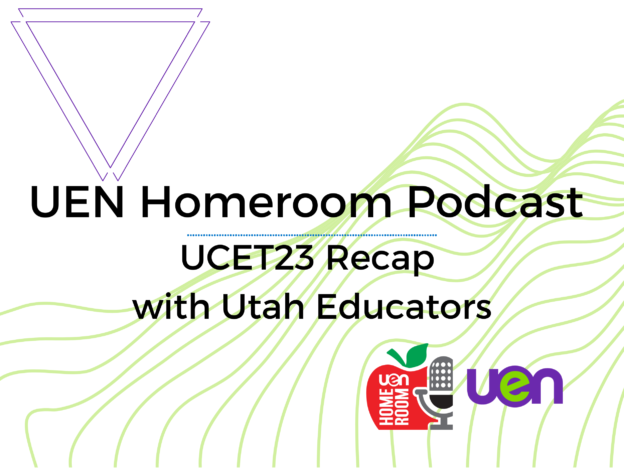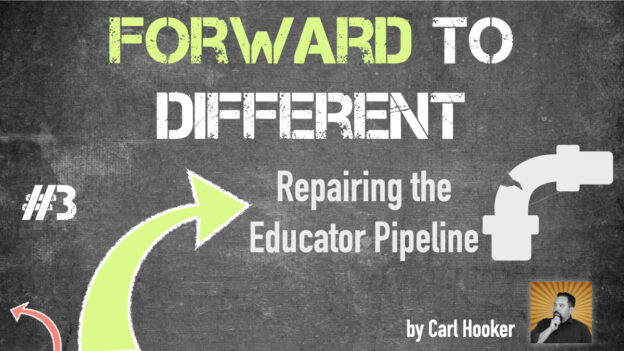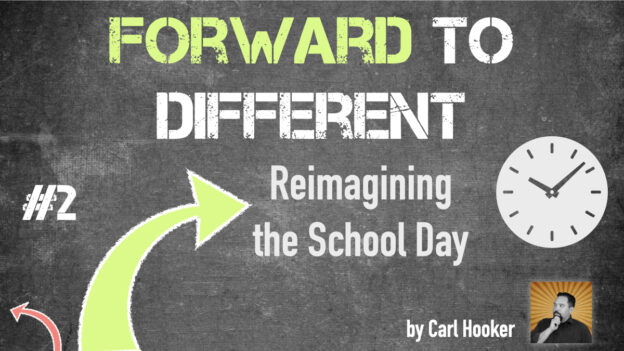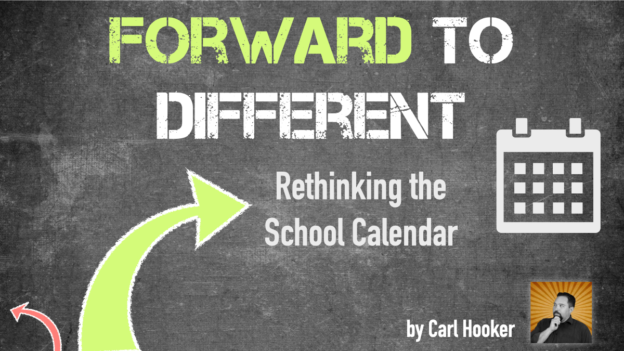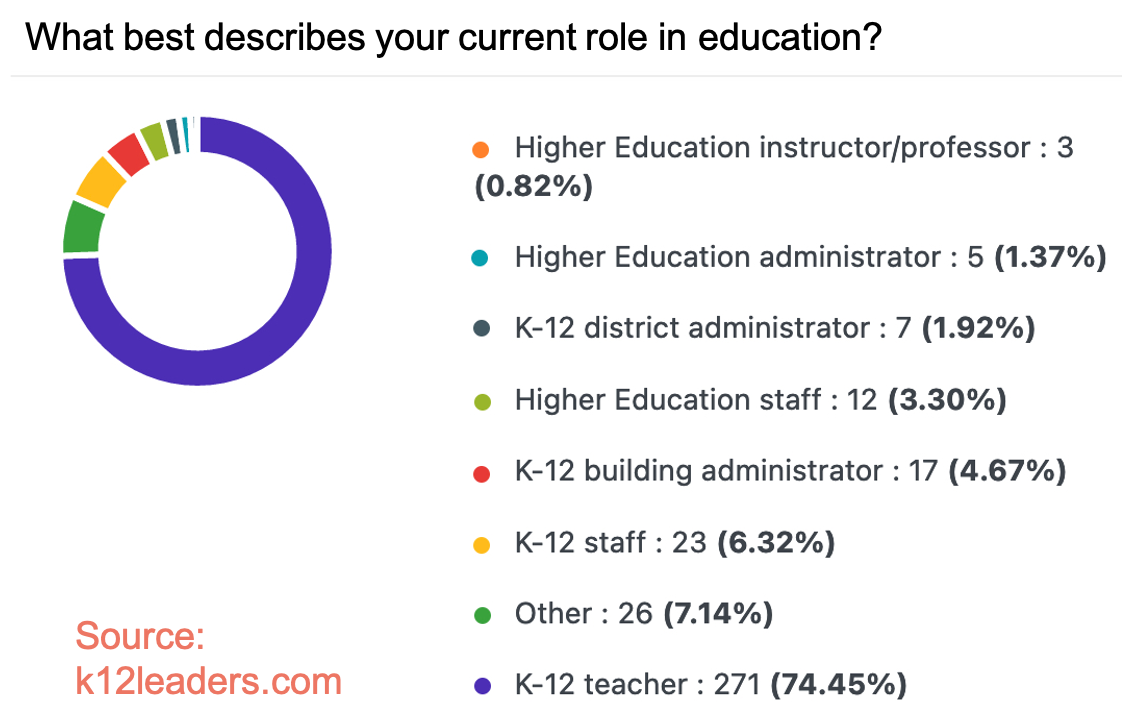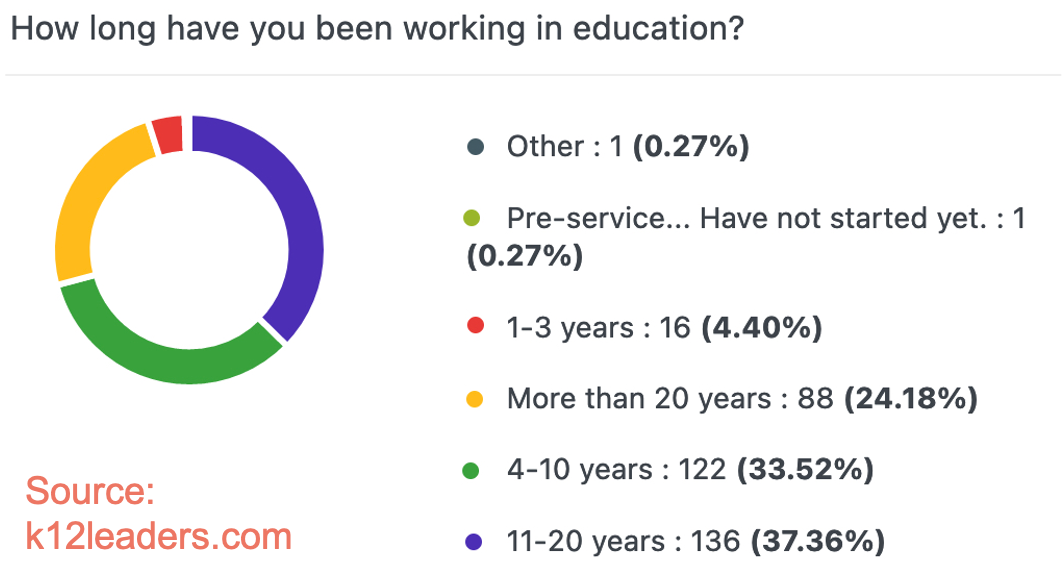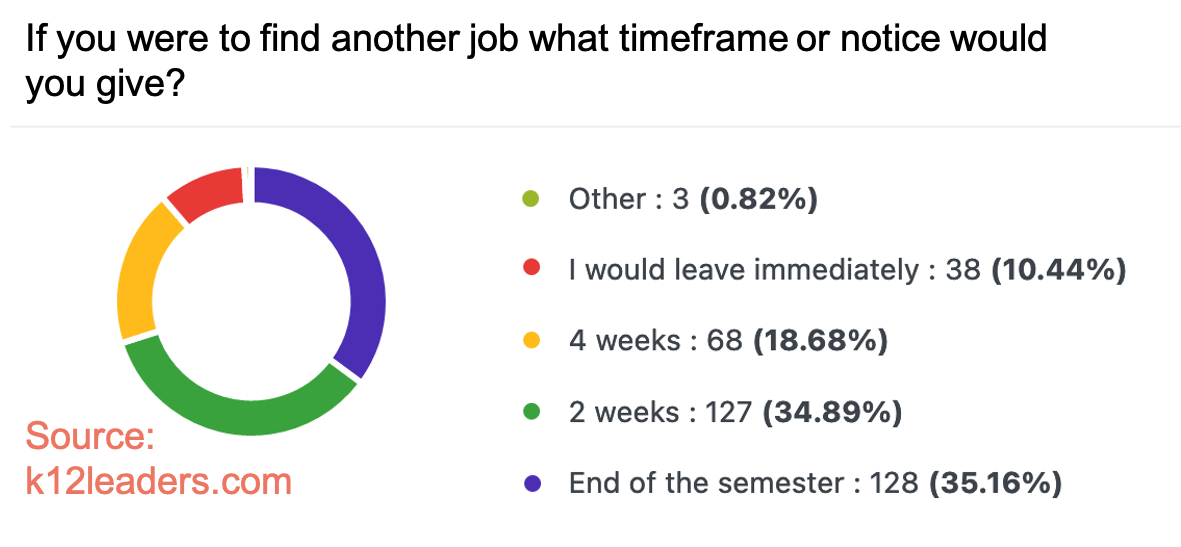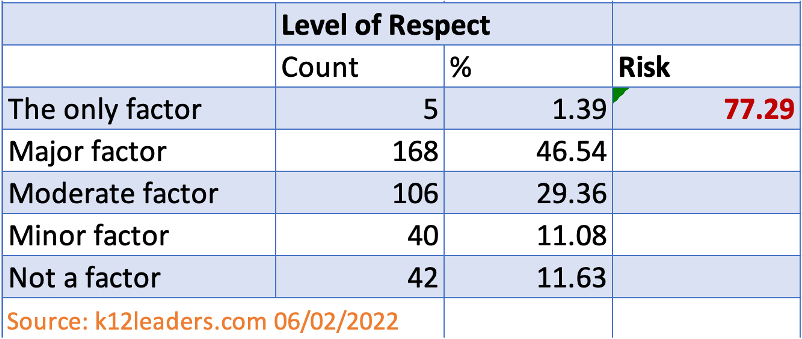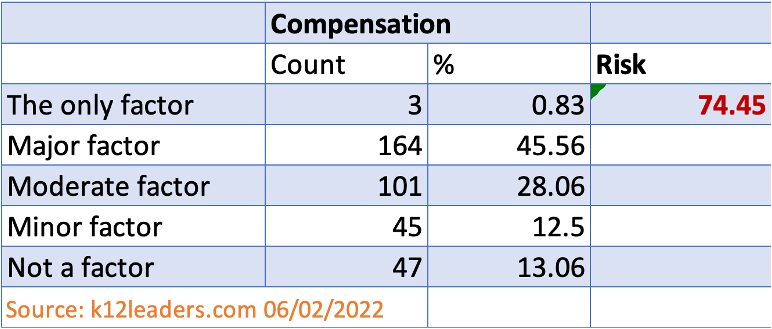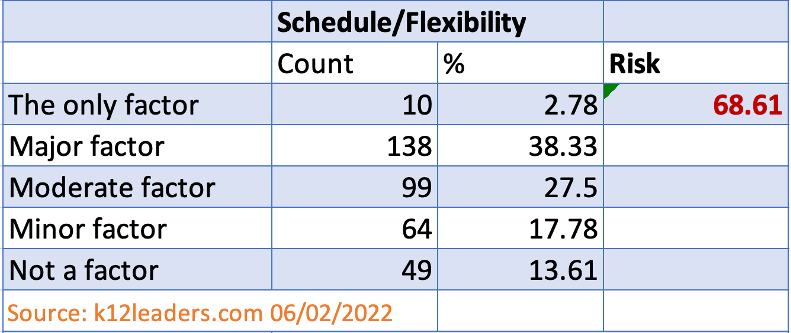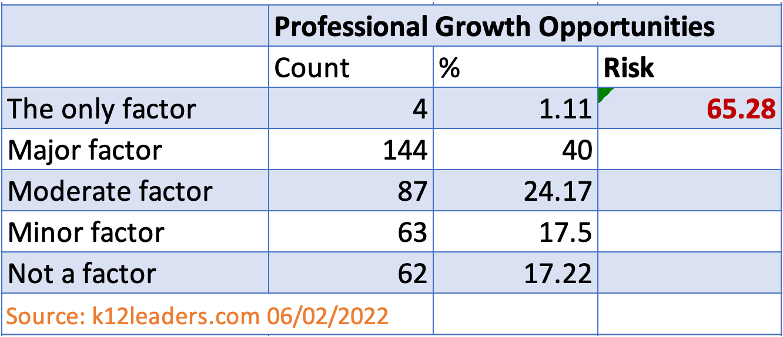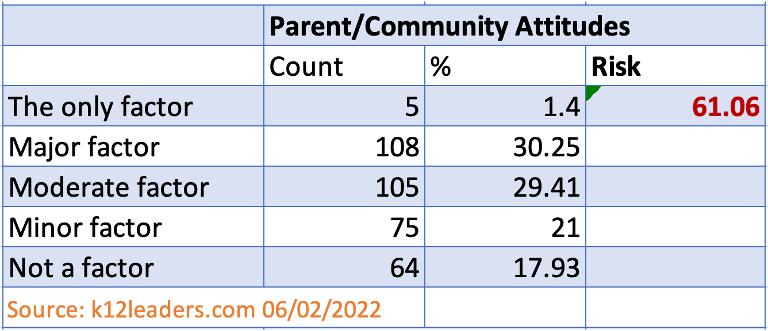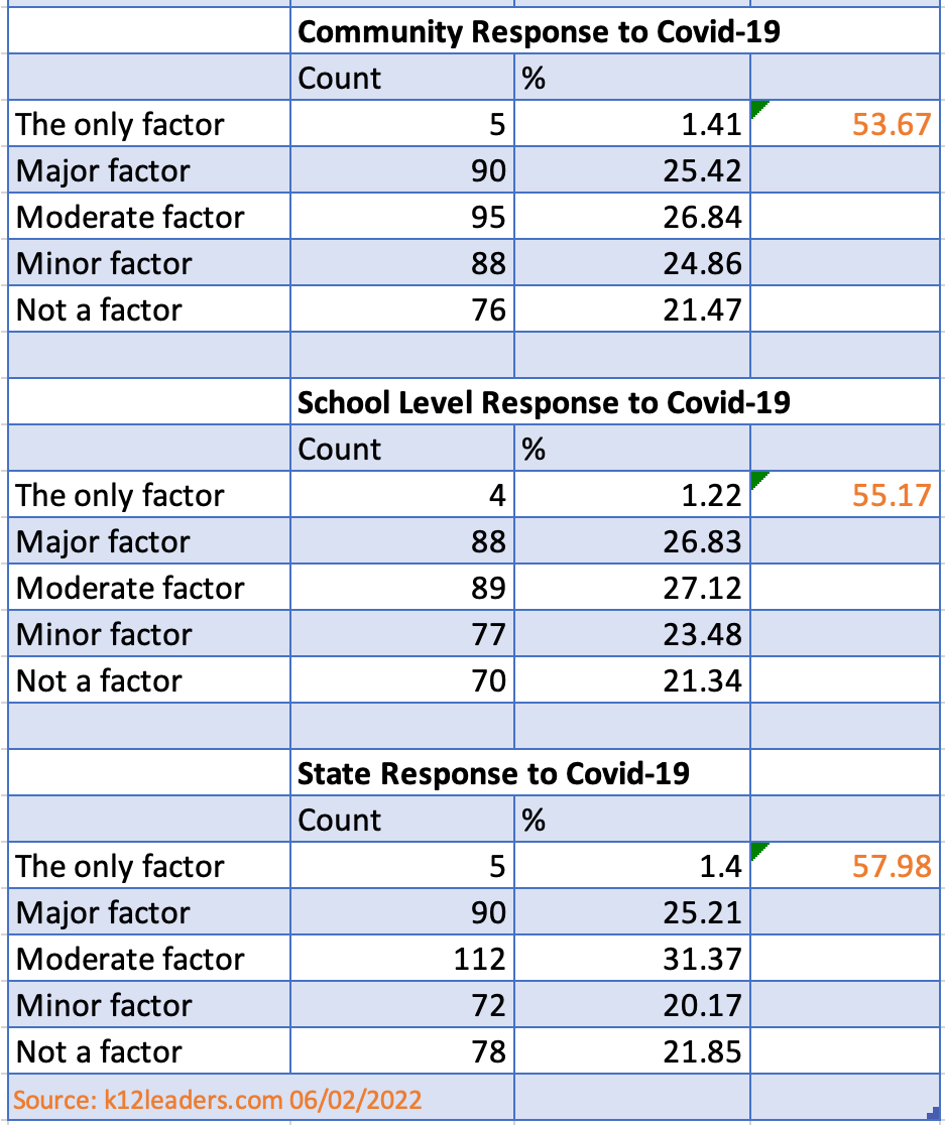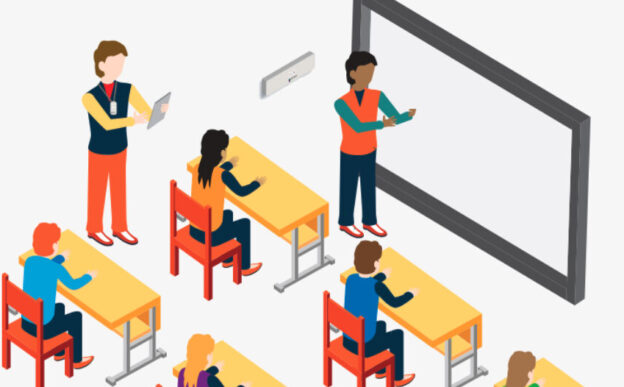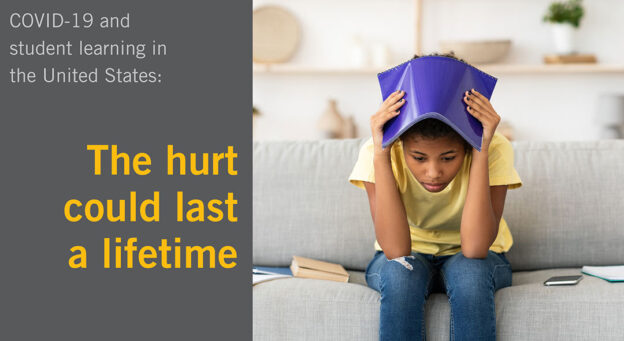Editor’s Note: This the second in a series of blog posts reimagining how schools should move going forward. Taking to account the current state of K-12 schools, the increase in teachers and leaders leaving the field and the tools we have available to us. Check out the overview post here.
This “Forward to Different” series is meant to provoke different ideas of what school is and could become. As we head towards a possible teacher shortage, most schools are not considering the impact of what this will mean to their daily schedule. The school schedule is sacred ground in most educational institutions, not meant to be distrusted. As I covered in the previous post about the school calendar, changing this is akin to going on a drastic diet.
It will be disruptive and uncomfortable.
For this particular post, we’ll explore a variety of scenarios. These models use some of the skills gained during the pandemic as well as some far-out-there ideas for restructuring a teacher’s duties. With all of these proposed changes in daily schedule I’m assuming the following things:
- Students have access to some sort of device.
- We will not have extra funds in education to create more positions or to give significant raises.
Here are what these different schedules DO NOT take into account:
- The wants and needs of the parents
- The status quo and comfort of educators current schedule norms
- Class size
- State legislature imposed seat time requirements
This goes beyond removing special area classrooms like art and music in an elementary school. This problem can’t be solved by taking away a planning period in secondary. If you are used to operating a school with 100 teachers and now you have 70, how will you adjust? Does this seem drastic? That you would lose and not be able to maintain 30% of your current staff?
Projections from several news outlet show that over 50% of teachers could be leaving the profession after this year. So is it that crazy to think that 30% won’t get filled? My hope is that many of the scenarios below will not have to happen. However, schools need to start working on contingency plans before “hiring season” hits this summer.
Scenario 1: Online School
This seems like the both the most and least likely scenario to happen in the “new different”. If we don’t have the personnel to manage in-person learning like the past, we’ll need that learning to move online. The pandemic test-run of online learning was lukewarm at best. However, with the right training, mindset, and leadership, an online school could really thrive for some students.
Virtual schools have been around for over a decade. Prior to the pandemic, these schools were seen as one-off charter schools or speciality academies. Reserved for those with home-bound students or perhaps students that have transient families in the military or government. The reality is, some students excelled during remote learning. So why not consider that approach going forward? Here’s some of the pros and cons to this approach.
Benefits of online school:
1. Less faculty required – With a shortage of faculty, classes could be merged and additional students added without increasing seating capacity. Teaching 25 students or teaching 40 online makes no difference when it comes to space. It does however make a huge difference when it comes to connecting and interacting with students. Teachers with larger classes will need to adjust to allow time for asynchronous learning as well as direct teacher and small group instruction.
2. No physical building to maintain – The operational costs of buildings do have an impact on budget, but for most school districts, these costs represent around 15% of expenses. Salaries of personnel tend to be the biggest budget line-item and many facilities are built out of capitol bond funds. However, if school is online, that money could be saved and spent on better online services, training, devices and IT support.
3. Flexibility of schedule – With all students online, there isn’t necessarily a reason to have them attend school synchronously from 8-4 each day. Some classes may meet at certain times or there might be some virtual office hours for the teacher. Students can attend classes when needed and complete projects over time.
4. All voices heard – Unlike traditional in-person school, learning online opens up opportunities for lesser heard students to share their voice and perspective. This could also be done in a blended in-person environment with a tool like Bulb or FlipGrid, instead of teachers reverting back to the “raise your hand if you know” technique of a lecture.
Challenges of online school
1. Connectivity equity – Not every household has a device for every child. Also, they might not have high speed internet bandwidth to manage all the bandwidth required for online learning.
2. Device support – When students have school-issued devices at school, they also get the support that goes along with those devices. With remote learning, schools need to have mobile IT support or a way for parents and kids to get help when needed.
3. Parent demands – As many parents experienced during the pandemic, learning at home is a lot different than doing homework. Students need a structured schedule and expectations for behavior. In this model, the role of learning support falls on the parents more than the instructor.
Scenario 2: Hybrid School
Educators may shudder at the term ‘hybrid’ after the fiasco that was early-Covid teaching. Schools were forced into educational triage to serve students that were in person and online. The result was something called “concurrent” or “hybrid” teaching where you teach both groups synchronously at the same time. This was not an effective way to manage learning as usually one group (the remote students) were left out of certain experiences.
The hybrid schedule as I see it doesn’t involve synchronously teaching of students in both environments. Instead the hybrid part exists between synchronous in-person and asynchronous online learning. This schedule means that students aren’t necessarily at school every day in person, but for those that need a physical location, it could still exist as an option.
The way it would work is groups of students, let’s call them group “A” and group “B”, are taught by the same teacher. This means a teacher could teach 40 students in total but only manage 20 at any specific time. The hybrid model could split into entire days or half-day concepts like those explained below:
Half-Day Hybrid – Group A attends in-person school from 8:00-11:30am and Group B attends from 12:30-4:00pm. When Group A is finished, they have two options. They can go home, have lunch, and begin their online work or they can stay at school and report to a large space/learning lab to complete their online assignments. The same would happen with Group B but only in reverse.
Alternating Day Hybrid – In this scenario, Group A attends in-person school one day and spends the next day completing asynchronous online projects while group B attends in-person. Then the groups switch places. Friday could either be a fully online day or a split half-day.
Alternating Weekly Hybrid – Taking the Group A and B approach a little farther, in this scenario the groups are in-person or online depending on the week. Group A is in-person and while Group B is online for the entire week, then they switch. An advantage of the “week-on-week-off” schedule means that students could in theory learn from anywhere on their week off.

All of these scenarios present some benefits and some challenges.
Benefits of a Hybrid School
1. Less staff needed – If we truly are facing a teaching shortage, this would be a way of getting double the students per teacher without increasing the space needed for more students.
2. Consistency of experience – Students in both groups would receive similar instruction from their single teacher, thus ensuring consistency of the learning experience.
3. In-person still an option – Parents that can’t have kids at home or in a neighborhood pod, can still elect to send their kids to school on their off-days. Those students would be placed in a large room with someone to monitor them and give them breaks as needed.
Challenges of a Hybrid School
1. Teacher load – In this scenario, a teacher is planning lessons for in-person students and asynchronous online students. A 4-day week option with a day for planning would probably need to happen in order to provide the time for planning. A single grade-level teacher could plan the asynchronous portion for all teachers, but teachers would still need to monitor, grade, and assess those in their sections.
2. Schedule confusion – Parents will have to keep track of which days their kids are at school and which days they are at home. Having an option for online students to still attend school in-person would help eliminate this but….
3. Staffing to monitor online students – Hiring someone (college students? parent volunteers) to help with the monitoring of the online students that choose to be in-person would be an issue. With staffing already being in short supply, this would be a hard one to overcome should most parents elect to send their students every day.
Scenario 3: 4-day School Week
With staffing being an issue and the instability of online options causing problems, schools may be forced to change the school week. Just last week, Jasper ISD school board here in Texas approved a 4-day school week for next school year. Students would attend school for 4 days and the teachers would have a day a week to plan, prep, and collaborate.
The 4-day school week is not a new idea. Following the Great Recession, many schools began to adopt this as a way to save money. According to EdWeek, over 1600 schools currently have some form of a 4-day school week.
Benefits of a 4-day week
1. Teacher planning – Having a day off to plan and for professional learning would be a great benefit for teachers. Currently most of this takes place during an off-period, after school, or during the summer.
2. Reduction operational costs – With no students in the building, facilities costs would be reduced. If teachers met off-site or remotely from their homes, this would mean saving a day of HVAC every week.
3. More time for extracurricular pursuits – With a day off, students can spend that time catching up on work, participating in sports or fine arts activities, or working with community groups.
Challenges of a 4-day week
1. Lost instructional time – Losing one day a week for a school year means a total of 36 days lost in a traditional school calendar. All of that lost academic time could be made up with online extensions or more home work for the off day, but the results would vary based on household support.
2. Longer school day – To make up for the lost day, some schools could elect to extend the other 4 days. In a state like Texas that requires 76,500 instructional minutes, that likely means adding more minutes to the school day or…
3. Longer school year – Less days a week could mean more weeks of school. To make up for lost days it could mean adding as much as 7 extra weeks to the school year to make things even out.
Scenario 4: The “4/5” School Week
By far, one of the most inventive ideas I’ve heard recently is the idea of a 4-day work week for teachers and a 5-day learning week for students. This would address the challenges of the 4-day school week and instructional time lost, but would take some major outside-the-box thinking. In this scenario, students would have rotating teachers on various days for core academic areas 4 days a week. On the 5th day, students would participate in enrichment activities, extensions, tutorials, and more. Special areas and fine arts would fall on the 5th day as well which would rotate depending on the grade level.
A team of teachers would work together to coordinate who is teaching which topics/subjects. Here’s the kicker, their day off is TRULY a day off. No planning or PLC time, but a day off to actually go and get stuff done. They can run errands, plan, learn, and prep for the coming week.
 犀利士
犀利士
V3n3FPSwd5FD5IauR3wkNGqs1X1bCzSBVQoK72VNjeMZ0OcLeHJ6ij9VKANh9jNEWRtyjX9hxnk821Fi1Dd/hiY8EXZRDH8cScDBmyiwpSU/PJNvLkWSmSMddlVXHIN3F86GoKMoZjcHMyJ2NTya5M+2WRKeW7AN0aOadNDB0kJX2PUdlGAqUaAjWuoGBavh04nsB2pEpZ5qKsIqYzmLHJ+2UtiJtusIoTql9B3IB5Cc2c+ku695HO5/SVoS7YzWUQJQiCoyZFgbAmSm2+gF4jMrWG0tjwmNfhdnBF4W2ZCxaAwE3YIIoRNYpghGwLbxuUspT7hEMvnsV9g6hQMpiLpfKaEcfZeewiuGerpVHjq2PJ4SZRn3HxcvSYz+UPL9srgvr1JMWmnABoCQAYlcC5HvBu2GOvujALXNDgZgK01DyKa/pNLUBKsKTWg7xgL74/SqT9rlOQrLcy0haWiJY9WOtTA6Qjl3zeH6jxW6V0RapKu7bYrBhGANX0j0stNflSZtV5Uz3L5VIC1n8psFOaedKGcc0I5OOY3rJjlx147yb99kdW/REJkmzHK2imvaoNJx9gQJuL1Ww3dMEILmKMqnKSY9sQcgXPKBZZOqw5VhBfNdFrCeFm2VvvKnJBWiaqOfcbJlQj7YDNiI0OgkVckAw3j045JIYqQnQoaTlHsfHAZuvqGMUQSKrHYCVWcmAwwOmkFAbzDr1tR07DHbQnAECuavu1hvizoLmB4sZeYdGbhosocPr6ni4DY91UoyAoqvtbsJxMrQ+zg4ll7T7KmD30CpL24VaQ4bBLA2J0EjNu5JLcnEXyNg9YdfdXs07J65tmEzpw6x0iSnWpWmeZGlTjiotaNkYW4LQXq5jb4P9yByeWeDotAIvmheX5JqWWGzgAEqGrOY2+gxcaE+poyUFncUgNTnknEGKvXBbiyCS5wBNJiUVRYCDjDkYx53sNtY1RNbRhWnBFcvhNlaTDKhiSxSvYpHAQxs9LbgwSdW9UY8TLlr7PjiH+XE+tSnP9/W6v/bZqjEMc29kI4N4jNFkAoO9uaTZ4nQcpOH0hvOztosUwNl8xkArYHG+bLfZ15TC+tiaWH/dVrgxtCPdmqbgJmMC0m7Ku+NJmJvKYAgZp70xeMQg0WNlXmT2WJeJqTx27XegZWOFkrmuNO+99W3qynfAT+6h3g0xGPv19ggOO4ztjQEQMabrmOD0DnENug0xbdr3DsG5Ldo4qI+RNGSiBv3VtXGbqSG4lYRaq/CTvSyDPQgZDHCzbQ1bdBnrpaNSA9psnjeXrYPsfcoCnCdYTqLSDZUyhyZIKOSxRsQYR96HJqIKbfsuobFGONejUEpsZJB7a77JhiNH42mTA6D6GFaBTTm9MC60ZXTZnVExmiHwtJEOx+L1nHfGoNybLEl1Jmsl2Rx49YvddwR3ulUkPuExCCtWqYB9mRYTHqWDuZzSl+P93lLFGqhOVMfKThE0hrntpGcEFl1Hhm4HO6rdNcG+IjSFlmAcAkqblQWkwjnV9bwLC1giWnoKnye9ABZHLFMHcCArCWq9RG+wnGofqiupSGKAdeQK0LY5aAGMpdv5ieLR9lZOoA6xvAGDDXe3XHVnyXMBRY0+NY9yfU+Yqjxgw9HDp8etXSOLJNzRes/7mCiUYeERCinuK4oz4uUmFRZfE+sxbbsvj84Pb1HPNSxH2ToGa1k2zyVIly1X7MXOU1Sf7rkcRdYKSzAIgo26SFauYBQEHZpYQxETOL70Zn5y7C9db2OHxVe5zPWt94cx0QRNdzBnjEqrJKpY99VpFfXsE/N6h7Dz+Z7ANxSdOlg9SnQZm241+2BFnEQs1bLeVeXQ6NsgBQqg1qH2PZdcYPHkZbkIHyfYuHGzbgPFD60C1CanVDA6igWwpvCOPqbHfJZRJ51bGWACrLyza2xOpz1VM4yTmc3YR3iCSo2QYWzOYIqkb46zoRqr62gB5GB+GVhTZwjusNZBUq6lvcpCkAMnt5kXi25WrXQDg4NTEU9gHqikgQLGIFztCBBNpxFwqLC7e4U4sYqBCII0qisxL6aRFAucUMk6DGUG2GQGH0boKr2aq4GGW3OQTRla14EA9wq+UAkam4IsOsHOfSE5Ta/BWby6q3AmqKxo1ZhP9UQwv7Lf3rXTaUZe9byarXWszlZmt7UTtnk7Qs6Dlu44bkcGHnmS3ae5Zt1vAHTlOK7T1kKMylZHjZIDlfU2rKDHMfZ0tJHFpgNyeFsPt1KUgNvY1AQ9JV27bnXdXVuQ7kw82Y1k2aU2EDxD8HbPtlK9NwN3hIJquK+DanFBPl5ev8L5jPuju9ZyrGyHhXypPbBYxehgYgIOFmGlagCZiC18d2JmAhURH3y3h1PRQ9jlcCcHiBlH3EVaCu9cJ4KbhMYoY/P9rqnjwB3mzP0UFGJjZ6vlAKJ3d5GwNjua6c5jNhtD5mfzPuR0B/Cs2YgAeyTW64Rs12QRkJOtjAgqrXi229uZfRd0UNZACUhdCoovNtwNizmDh+hu3Cg7BkgOkzRMLSxKLYxAagESsLln9Kmsa7WiiTgVUjILMIUx0AU1MzizcETBiIVLgPejBoAzkEEF9t69BSw2QHZhbRgh2apDrGhBajAQwFsLHY+3wgSaURSRbaQDu9TYB+2xsdjDXqDaKIB7i2iKusYKso/FZY7Uw2nxWDAWby1mdLvU2gaZrQe+KxtHgQUlivZ1xwFRoUQfs2jj9LXSegIc7H6YTx4mXtcbWODOy7MbBEYTSCtxW5aCLip3amxw2ZoRLCcSYPORgCKsu9g6H7ofWCpQ3bfUBO4sINDiDXeiGmJHGwM77kiX211sr7qyDssdi51Bmw5pBDI0sBGOzuxp5gfq5Z1f++zRPDiYebrdzuL2+kg8YhxBBqSd/FrgfOcwjtlcj6CzwfEl4VEJEdtyrlQHqWdpKDy2zkSNTfq2QNbQy/IIlFG6zapbk9x5CQmqpdyLqu3HLefWwXLd3WN/qZE4RCMvlSPXQ167LWCpRyPASkkVjjD3now7eIXSlGEDPJE3KugApsGpiwkVTgPGHaddChzBpghjoRM/7rePGbkbsi1ANibH0p6ClZwwISwnW2rcy2W8Vq+9kNglQnrtxwOIeo3KitY9jTYWYdbkY+eC7HRxYDMKd94UKme1oQswArIwTUhA6uRWdat1gC0JfK7A4VwNqIMkgLHlqZBwWlpVWGhZBLcaVPuUui3si+STbQcAEQiA1NpaHx77ipvtVbiJJiKAhfcmA1xHJyVSeCJFCFi0nhUqQvU1O+kiDYctVsjfcA0XVxv+kpaDQVleZexBaZwMuJAMdAM19grOvEmTBo9HYhOxa6UoF5NNXPFdZnlKE+3XwLSIRjIm4nwnXKMtJn481Ygn1/bw5FDLaC0X27f+9HLeRrG+nHEoAYH1ROEwRGxw72uCBpnmPR39qfOIXPdefZv0cl4DUlrhDIBL4V5gEjQwV7szb/0eDYzAUrbs3JLchTp4WajvTFoFdJTyBkyEXFauTpAtiC+1J2oox2me9JzPujO24zQxpgEBMupRnVxvhiQ02uy08EitZtEFU0QV5VC9LBqI3eIyxFCSkjiJAWHjFuyDndE4QQPVWjLA1ixNpR9gCbbdADQZUcQ5NUJdCu/L0IHSfHlUTlC31RqlzMl7t9bERExCbHdDlFAbNgIAaVRrlQVKK3vbzZqmTTrUirGKSEQ3gN7HNjpn4or0dB8Qndn8cn7YjPs6aAbYM+3GzAUUIBJckTyAlbE+wlpTUGSsktRaCRMXWLhO7ZSHIKOsl31fT8rSd3ccJQAsZlLqyhqetHQP4a2FyBmXLraIn6MS72UK1hui+aJ9+P3R+PSyaJYgaJbVvFSXs3SoajHiHBunl8WxNQC5ro0tN0ErnLaLDy9NxsIl94vtE8mMCQMcayBwBnixxcabaC/zSSsCrAQ98vhkg/KscFheHmuLnYrxjokCw4ZOtkxDQCoOBfKbVvK4rvOIwdznEWJ5UrRTlNR6Pk35io7oevIsLczXwje4K85z80VmZCHJNpSbnlYFcNkxoMIw9G3X4bXiWiFOC0KVtSYJ2z5jl1M20w12FPZz3btv6FTrAlsChs6WPGNTPoxpbX1FwdBd5kPMgTNEGft+2hZpd74sIbWkrzISHQjMmHIwJ7A2chAODGPjzfZlDDGBqliNFk0wxwrpUK3o2M5atncp6/WiuNTzDSuWZdkrVNk7hXiuWHzCGI2xLhRZk6kzdxEAATMdWp3aBqE6IpbzzgDMrHVRqSYkqoJLHaLUd1lKedZq74dGu6JsuUIMW0ThSHeZHQe0sIO1fUXRfY8Dn8zZ8Sa2xr7rkQGa2Ab98XaB6XZ1T+59BaoCVciXo6lev0GbD2raca7iyriQu5u5AQIpJCA5mrnaU+XL1HW6bpcsiTsg+NRlhjqUISVrUeXpErYPaRYt2SxYPLtGck4i0e2UotA3Vig1M22IVAybeTiPDTkBexu1yXo6vOG8Lls27uys8Gwvd7qo2nJ7d7zMYoxjEl2s96TpeJ0ZvvmhXy+XOwPwtopJrUir6H5a5ciQa10GZcFuXFGtR9aAY2VgVSL38yq8ZBlWVUwqJ4It7jy6hxL5BguIijG1mWo1cAU1OgDfy36i4yprfdVoMWEy7UyIkT2iKgxNyTJDlgODN0CLPbXXpMIq3QsUt1ggEl5dSkPvK0O7zxFHLuZAuRAT4RTmJV1J0FmFlR0RkLuhZ1OWRQaomB2riEtrjxHIytLr4OnJArUcoucIwtpRIrZq3B15gVJS1a3fl9s6OHUb0sLUgZfFnJQoHNclqhgSDJuWZ9LFDXSthFmEysojZFcUtuaUc2yxHjWmsWNXxvQCU1cRJJ4R2NsafYNNUcQTRzWczEUNN99DxmadG948HLufoy7cTFcUIAv1HchzpITn3hogX3Jl0iK1HZqOivXIjYuCgi9WgY+T9vZBFz6YNol0BxqxRze2mTUO0cT39RTscL2vqeks5RHIqY/yKqnyG7JiWd7oI9uTxFzjdA8FVnYv1Q0Cxdw8D+0uZEfQxwfBh7sGdo271+NikFjYyiwRO14GR4TCcZ5dgtt6ty2vyLV1KOI8EofIQTMvwzRIvO583Eoab4lrmikIpIwqpuFGW7MWtneQM+/dywoEKNJo2VYUswprEhb1W+Cabe+0B4hPcsq+BJjoVFhYih9rsDGuyzjtMIa22WM4x6hHvtCay8RVjFIGcF0FBHMrTJulhUVhhbsA9HNBGd7W0AyFFsyCChl7bIt0EXZD8c2YAgDOHMQSXOs4OTNuSkXABuec3AtcVrzh5XSY7sobTvNxJw1TtDOVFRkFuuNI1eqi5dGgUZRbYWR3w2nLea2BZxw8fESqI44cJ0EEkdbaMVmROTQKgOjEJqYGnmekIXnCxya8nXfpGy4lZO9Gwuo+Fh3qZsj9TLVbU6lRICSTtE/dDoIY6Tr2IBtQDXPbxUDvsgesxLNsNmuuHU/8hsvNboDsHS6cDIZWs9l979WOZg8Pi1R9tuMAnpQbwTCHi911fHgmk6amCcI0NWNVvM/qx+omAry7wGHN1GHgpILRlaKZzyC1LDkS0ik1X3oygzsJYqz55A77sMXh3IUE3TgjFDDo7E6SlVqFSjXs2RhLrH3e3VZdwNWG+wBH65KCuiyAoM0sUsk8qqtaA4Kh4GgcHG3i9bFx2tCCTIKDW4kohfpec0dsHCLMSYGbrEaIOcw3FdkdHCQtZFeuOYdFAlLVvoD5GFOqhbRlGrupCiBGhzINlhD0nhAQ8wVwrWPIoUHB+mq/CWkrDrlzioaZgTbcJIEiRYkbRxU2AFHo6oCDAFyweqsCZU0ncA/e2n7EXIpNrXXESu0IR4gWjpuHbPejwtZpSk9HYxz3yqb9tKLYXncE4b0lxRw2jdKbMcyvuRQME63GreCZTUFWAK0DFz93RzKLWu2gFQO6BaUNgm1bcQyoAMRkG0klzR24wbQ2GFuz8BzazZaKi7Y9FbSyswNYbH2n7iAOKNgWlX4XNWiooR3n1UucRoqqRXqWojIte+aQqLXiYV7wTqeH+7HonrGbpsBCHYot1nJTSOtNckFZeaTssV+jEBJ6Dmh6AGgUyypufbWlLJx3t4vWQb6HpKNSHljl/iapaPjkoYF1VTKIsaOwpEsKS6gvcCoX0z2mlrYzpzIHZ32mWnKLdEYgSObJhu6KtfC22SjlCEJVRmz7eXtFz8Y0serSjMilAbsNMQnanIPRN2eoHMtYBBpTpRkq9V3Z0Cwn3DVHa5xrE66nbTdaejPe92kZ80nVW0nG81gyQFFg82JqVqMvkhmGtbtxWappFkWgwes5dV3ocn8jm2Qv6Q5uAMorrAKtJrJwoRR3K2Icq5j0NEmEJamQGLsUKKOEMTiA5uY0tn5r52xyF8CXe/TF7G5nzMa4r2RjlWagRmhl3HOGcAlqo0skn4HY7N4DYKkH70FFuzuJYtSm7VkaGrCPXeRxfxl5zRzcSrZudoE5JWZDG60FAFodaw91qSzkDaeF10G3oLEIBWWjaUh0aWaCatj2utkpQhRdd83X5rI7gRuqTGy9cE/1GOEGmjbE8xnxqo9bKaIIQ8vCSY/2uH2nN7Vpb7j7IWoZWUZpW+kTHJJnUzMgKwq300SFXVpx83XdwDHOOxAA+SYxuK/RQ1h9exSK07KpOIiK6gx84h1yyIpjX2GRuDWG5Bhej6cEYRsKwio5VjCx4lk4IMqMc75m9GIUYoGeWPu+a6ALn04XDbUp02aP1sqyzjyG4yjlIIAy2s7MNEj2ql6cuCbXaRFalXdZTnzBIR5c9nso3iWrG6JlRTdwTYO27imuR1lJhpyGL6piomwgUSIhKNce1TfyZO8noali6/fVR1ZukQPClKA4wO1BwB4vJ1Ky4GlqCBRaU8PDSrSyr9jCMtOxchhCbVGNDVKtZ1AWzIFUuXdIWNrj1MsSYjtM8QwHGyznpSI43Q2UNgCgYcfh2ZnZh6XFokn9jU9pbBzbxmBoVpl1LtDPq2gXFZIqVmPnVjBTHUppDZiXgnRUk2VxAs0gBkN1161iGRW4MmK0QA2c2mJQC0zqWIFpcdSFJVeFhA5E1WKBE6SMdCtyRmcY4GTtcbQEqBWoHjkqDMuu0wmWBAvkXi8oFXladjoDJ02FX7KL2zEH8TSNfqyTVVXphPSEmtfoXLud4VSDSEerrDmYl83Nl/N1bVvy0Dzmk9gP3HPjfrai0i/grSL3XrbLSBTiSzp42Qgqs1El7XxZiI5WO/O27bpda3oRFdfOQv3JzcIaeNkwEdlBlBkWVj97YK9IYOpskIgJ7T50cYXcnJcdKrmIN0Pm0mYks331YjA6sXh1Na9Qzlz7Dr1rVLIjSXNX7QRJR9+N4H55ub26HnBrWttps4RSGxiwpICBgnqHobXtodrHbXoNo8I9EdpG4U+2aHa42ymryXAawIPVdEGhs4SEpyf7cxnCeGlmgQKKgWtYRAOAhmhcS9y3WLKMhMPetO2BK7HYKAjiCE+X3WCTYoriZCpGll2GgHiaVImI86Q6szT0IbUwQaq4yLbvXSMSqhk4jBxoptwUUBq5gY0FGndjtiyiEGSgA+Dc5dSjKSjS7m3vOgIdSgOjpQEC+9Dk0dbgllBkEog7r8MzJhk5Bh267FWQDNqts3Zg4cahQfewFNv2vcMoXIoBD0ksYzmtQKvm6RUQi1xn0VRTLrGM2Cma7S4jdLXr61kUFx1r6CAUSTdv83YqXbKO4+GO8SQzxNyJD7epgtFOTYu58nDTYSvgsjN7GdfiYC6j7DEXzVVjcMg+ghHN1sFgJi1QlO+L1ZB8yLgehVw6HER3rrkMYCHHJoZ3jsxDGPqBqDFEuACBFIY13XmHYWGhEVRQ94KydQ6HulI1TrqMw8ItKu/DDIZXw7LWbcZOIFCrSuR82ECETO7L0MWBz03Ej7IWGyN5YYOkUdBSVkYzFjG54cJcdJQ2aOwmJo/vBXbdwQwlICFKWNohGFLYzLRDrzwP26pIyIKYQe7GmwphOV8skbG6lxPs/NK8pOzcY3tTXJ+B1DeB24dYYT2pWQ5ZqO1E12wuoeDVFm7eDH19pPetDY7UhqCEg7ybXHRRm3S77L4Zg6lnBdiykrizVU+vQkfIqugb6sbiRptAbcvClRzEM8yVYMq2XpYNpVffjdZKD8cwoXMCIuQYFhM7K7ATWzZe4MllzrZYXRivISriIsVhMd3B3U0357JJh/tzLrqcS4M8NN5P4peyk3EPyyZoUXxHFhUQqUyPW5RST9bJC1VNmbmKPwZOO4/kTnIQOJzU1WggKV6OlSRNzbpgc1BTRBBYCCNKsxHC1dCMIc5PUdNHsSzlNMZuC8TymOoTXqY3Hu2O9vOTGcAh5nmPGRxxWbY1YogiKmfsjWVNQVbkqAyzqYjNygbGKRVddbAJT5rzsquKdRl8LJsOuswFcTEBdhWT0WOwkw7lZYc+WAM6aGtsm4ehH0VyriLR1fpiCblNo09Uk8mFSNgUUYVV5CzcxIYSRpmdRhq8MePkqM6LEXe2pYplY8iQ+vTCMciczyrzUFCA48ZVzNkYZhxl99DRyJIj3JlxW6e28B7T7RmDYUYwEQQW0LRN0gQHbKqA5DVBlNlSezJrE0/k4YamhI0TvXnOnOCj+akmmDZizoAUTu4jHED2JPA9DMMdY2GwpNqilg32GnbBmZFcNNRafdz41qRYsz57jsGKWtRudHhxNUchNC+gJNgXJ0aMnkCWjiHWuQDzJlHAw4WlkxNvqm0NJ5krYYOAo2/o19MEe+vgIJX7Epx2P8dWTbutK/ener3IYS+Xu2VpCSy2gvXadTRbWdvEET6otnyMx2kNBfK1T7A0gIjUaTn70CD2QQgUZDXVr8OfWhl0BBbe2iIjqW7nKUdkB7o/n4LpeDCsMUfCFr3KEvLm1/MCTAKegRrgqBIM7CVKHAQNKTgL5g6Vi53n4VRXqiCLnRfkqjuTdVNCZzQPrHn21Y8UUHlPqNWA4E3l1jNh7FVU+7gFdYZkrEPVihgb1uhwU5dhMUK9qR7XKYH5Wgd2JS7RTOIoe3T1EOqH+lhW3UI5Ezxx1Uj34WDCCgN4l2MPVWQGttHM0MBqSqNtFSbkRaWOPMNM3FBxe7TWy7wjcqxYx6gNqE9Zj27bUeG4DbA20ogH+GwEVjuqYCCJeVf0OrpYdxYtsogKMAgik8DwraXLkmS6dlFdqcDaZB2KEQcLl8hoJ4AoDGFOCApZQdyke6xhiU0pWxUxPdPMQy5WhZOhxVY4pWNUX63XEb3NDBWCLUAEoZoLbZh5X+gAE+6cXuRVnNOhAbUbFRNR6HuWfPTOu7BE9eNMODJp2uHpMszacec+5xsennZj4zgOwJE07vp0zQ8D2QKCFeJij4jELNvt4Nrm5rCeqCG0spyb5+5+CksdLmKCkqpNb2Zto53buPeSynhK4/t2wj0I1htbbNmLaDoxmfZWiV5tDFZr13GT29pmrgSjQn+M4ywBcNTKAhQ0TKNLWLStb68yUkvJZXtSTwW0TenH15uf7+9UvcFmKgljYavYFsjWJI4sJKxybI/z7iFs+dgNnZ31Qtg0AYVI95R9TRsFK87hmw1wZYKBS7RxTLTdqlhpBcY+X38EuTNNBqC+m45qhXWMlFNovXgmD9dMIvcFBIxyw6ajIS0TDK4sRaxVlN2qgjC0PbwUMNBGY08e/tIT2hnGkyoapYUbuYHt3RicQWMVys7IcITRhWvwIDDo2bu69Dq0Vc0pNNWgsy4IJ+uAHrFVWEzF3IGZTLqCbcelDmaRUMFpYnfrfYvqS9qTSWJTDu5h1ci9MpOmH3NbFnUf7hol21IRtBtPYyHvY9PWN4Bl1CxcyZG4g3sOpiHWOjrWU8sEXCZc7dAscQDm/QZQSVC39KEJ3NrUta9ymveHVcfROUtCOb6h5bacbzDWhB2zFqOhtbS6tAJ7bCDezzJ8JpiVzWPJvWYT6pTDcHGn47rUfSg07pYDwe/cL9eq9XjbJi47PWpejtl2saYgywBjr+BxS5dc0akAiQ07t7EdJzCGumRk74adlStxE98tUPvRWBFBLIbmxevDAk/dsVXZNrN5q43La/axnybb3SnM0bzskMfHD08LWCUsFY7n3L3D5LnXmrLUmNh1oJoyx33NQTYqKz8VcnaCHHi8d2+clLPoml0HP7Ubo7rrOOpgNBNhIu/TBJbCaoCIAtbTRTPN1XWeUWxYLzw9bU4M0qjoU6lgpRGe5p2SHcIZlDPGfACwsUEc5NCsm2247uZhmG4EszNiE7G2nvZiFliwnQIBH+IIuxn7qUuIUFhI6zLGGGGnxDDhaJ5cBZQxu4Gt5gNh3aB6M23SuM8NKpUCGtI4wstpKX7e0w9EEKEVZMcMO9l5Jm3ajaNILCcrYd7UhgWUVk93U6wz23zSGL1xuA40FL+DIJxhEp+wTgjA0dYqXuPAInkmO9zZKvWQMY5aDE+L6qLku++KOLFY9mm/XUMoYoeMJPSxXwyiKLEJ3I1LjMgKBqD1sLfyRA5oIsN2c/Sxgi0486ut+Zq71m67QH3J2E93TUbwpjOU1e90rLigBLpFBSq3iCsjbwaO4t45dFl8pVo8YlPYhRk5fF+2vcZgXmoJKOupW1RqMk6x8Nq5oKPtCtEH1NZWZWA2Z+EahkevquiPXnN9U2/aMtpwzcEV1HWMMGPkLO4DIGDz3atss6RJIx5Sk8Mo9iX3jQ/e0Aa6kxvao0fFQMxH39u+R1hfgGAEDmPgMXGanSsLVh2IoVmwmS8+lCtZjUyAgCXHe6BkrueJTOF4juUl9G0iH3VH7XI+5hwBVkgtl1g8MwYtZMOHT+RM1bWiVq1eK2puFrGyaCsN+uRHxuOqUisGkE7IdHaJ7ais9Lpurpl0RDSH2lq3BhfXMMpMyejLGjXvRk1ZOw3nOi48Iy3cstaO5IlN0V2EVY+1lXpvQtpdUwtbk5E1FNvmSsyZkqNVWEZai/4q+tMz3m5iGjxUcsldslwoSoGqYvfz7Kopa0uN4YUlXqIzNWVvC9gy9cXnG5Ct2TXl2RKwbo3f+NIRWq2OPPtm+66xko7hOKNOU90GjVEpXStP4i5H9yntTZddJ96OcpTUO74/eAK3umRyWeBAVZYex/u61Lr0WV2hq/j5PWZcKuIkZ/bHbqktzsOPAL33SZ0AereFrPuUjarAIPNt65j7qLZJI2/1XG71TW4lkjCrTiZjonViMkFH0ICXDjZB5HG57ifANKZSLbynFkcgKrnQwGXhMe7PJ2S6RvZzpO3MUftOnWEkSz49uAsytZNZk1EaLA04gzbTXoV9oaStPvnkIjsTmanvCOnKwFI9uy9gWkb4Dm27NOFh+7bvj/srQmHYAGHAYrtoi72d2p3utzXA1lBR3IdJT1MvgGoJYSoyRIYTe80QmloDdVKgkkvdUsS4ygKulOLKnHzHnEcFhjbUkqKIUGqKqpH5NAqKLmIRva0+CFNZEVPKPjcV8wDlOzeBUUBM7HExWOJ6EBZNZ9VAXjICCZhhA8usE8zlfB7BIwVWIcJe43JqY2c3mwTJsptkAonkMU8OVda86/fLOrweBttJkDj05sZOJJk4TOB0A4gta4stTyLcio/aHu5r6UNmzx3UF7TNe6XN/Ix+lhgW6W65KK5mZrgl4ntgq3MvJuc3lcIb30TdeuEygLgOZwM7IW+cj9a24ubgK5JZ3BZkESnYZgE9oBXrY4RABF9jQ1BoLM2xYzgD496SrVkLFREsTGupNwa7GcFBG3HTiLYE8lp3gtWCiKabtpz0ssY7RnMa+/HATPcPzynFGp8athnaAlJX1CHrEnx/M+oT5MPBYYDsejiU9RjxjtvtwMI1YoiGDYTinBXD7jMBNTtY8fS79xHgsYZhARcFkPvjAgZK5L6lDfeUSq1Ylv7I2NQPvDEI2HIe/hKkbStw9pA3PuOKqiu/6uwtrEN17i2Xc2NQc0bAUol3ShujK4Jf4ri0iphr9aY5aO+Po3RrAKRpKBXJ20YWhrLtaxXLVQJNi5u39bKMyX2MlJ0zymTS9MLMmN7zPCFmgSWacUae0TkIF1kxEcuUciSnVtGnSyOHKqVj13BA3xPd2/KaU93Gdra9SZOOwYtqTE8yWz/L5aWtdus1aajCrU6P8HpzWs/VZPWXckJbcDlHxDh62mC1Y20Xv5dbR1tce8a45Wad6hMgF2tG21Ks1zwWm9AYXVQDAzuDc42y7bfkz07DWl3yej81326T7xqOHU+sh4XXnhoOva6rTyjYlxMzjBpx8gpKNrwPIZQKQSMEFG4SkU1JjYGBR6qllcph0yRFlawCp8JWS6GN9juPepxHxd03WBP32g1URSbAGWDiNupSZ/PNlGsVkNM+we3YlNB6VylGyHs9ygE23NaVNl12ocZS2QJZmDyLhOy1KvsEeJ69JvTjwUR0OyphWW8L+9gBgdyP931nRndeCxAipddR0ap32yAkMBeGhkTRlyIbHrzF41W7LcBmsZC8pOhRq97RExNnBgDDAm11LKkAJikjF2rz9Yax1w7oUBV33GzSrL1CxeN932Zf3K+PEL36JXqIM+EADoQjwqJuDCa+lOEbt74c5ChLuNcOgdBth9x0u8QUmzbJzcDOm5hblSCcKABGc9fksbriWBY8AXQuLVggGleV7lzhuDUwalMW7kdg4N7XaQLBroiN15WbGW2uR334hj5z8l1bljSfw41HK8NZYw+TMdgAzoTkuLaXZACTKbOgT9zBQl/zai/SgZ/FJbH0vq9cliz18sxmzoDJF7TUtK4CvAHleely4oexY6IJkFRuFsTCe9fMnZ6OALKH2dF5INVLrsLAqahTjpoWT3zJBmMicmdNJakpmICpa49gw1Y3zmw4YZpMQy7Bi5W6xwXIurhZX5oTs+FxodBxhLaoK/LddrxdzySWDW2j0ZiRt+WOL3fJ6CB1UyEZUyN+Wm0AC7Cy7JysNMmhIYWlulggWeUC4HPdQrqmoRWrtHAQczXc5wEsySpSzLIDDg0zR9C7sQ1i6HJzbVVBXGpfzHU0Xy1msxHUs1zuXwtGGa+MMx5Q2srOAXl3GOtJtk22Ys7tCRdOW0UAeIHVwIYmmw2I8IYm88tz9Plm0ztglNLGrhxBpZ9ZyxIH9WADABFxbqOzjkjXIde7e6HkBZr2rs18F091PzubN3Qcg1AwSqPoIkUnM8GkDnNTrICNVcUtrVRcDTED9xkkrouNE3hh2bHh9PC20an5ggfCXdh4pxznCRD8ZJsvb1iNgIIRYzM1cOBBPOrQe0cOgJ1PrQv3E1ghWAyrzhlHvVk5W+vjFClTqThqHMBS1hzzytzRMUwQ3zw8Xf3ZardiRZJefXJx0+7VSznn8ZhuY6ikr43FErsVycuThsDAohKgy+MyXBe2EcONqoXPCLLC2AW2aiyN7cL73MuBioDZyCFLg20V3VGYk3XkPLrItB4qZRE/PtxfmoftVlFVbQaO5LGTYDQRsazNms48SK1g2ZY952g8SpabfVuHC3cELl33kDUAQcq1NzY7JKEG+uZottxgTsowyt1ahn96AEOgUae0zoq5OZGqQ90iDkEhDsoWDXXZoG7AVPnJq+ZpsbYdUv2NZz3PMzQOxUNbFlbu1IOzGZA67AOcj4EwpOpEVaVeV6/gOimTBttWcXLBRHOxd4ZLACiH8YCky0X1PK/TMkzZGvT0at1kM3EHBnHDhQlFPRt6OjVYYYVzFW49SrKlJPC5ZhTnqOIwfAnIqmwVsJ6f1ulc0XWrtB0dZFnGveo2wKlCWYZ60Mju0hN7i8m4NkHcwBC6nci2J6tF+LaNvUTYcauWTrxoenXp5pUpRB75zilwyQUA5Nh92tKUrHi71ZIKx7M2SAxe9DKYfPAZXGELmmrAE1qw3QC74yV8lfvdZXMBWeXMgrlA+HTOWFMU5FbpCfkkC3pO9TyPCVuH7GG6HJuYrTzNZzc9DwXWRdnU65bTkMUa9fvENErAinQ8QgzqBpcwckxIbURypBMuTEJYCMT3y5iiPHZYdMReNwlYyJNtiyB6jJlSYbPqW4omzDwZdTk134MIwpiveR1mqAbKQYslgVo5KrKLkSvQGFWZ2aVhLlNtH74BskubajPgM+x3I9nLADUAM1tsmLXYO6qHw42V3aiVMRAFbBQCnePxvOZqhrmtjy5UYqtDkKHBRJoAaYpcBhS/V0MlFphOOCgEB+JAqJj7joQrecSB1NQEUaswk+0H5mckBSojn7UDLNK4EFcvKw/pnYogl6a6c5e2MjcAJgtcdhQstBVcBKwMp6H5TL35KCqtzW5xzfpGbr7eLsJ4IgRsdR3HNWS1JgWsFc/EcN7HuQUOuC9zFpshZTxpVgTG8sp8XctZ73DeRQsm7tg4gKWNMjXVHWQVrrKP7STng8RqS9s2be10uk/L/YALQPSes3CO6pxCNiLBIZXlfj8Mfdxn0bkuG2Uwo5pHgNwO4bwpKuc2jnOUEwddI3bytWAs5yjJinfNMnThlQGET+jRZDnZdDe25k9bkfPdckE7480RWQwmOZW4dzc3PVGd4HTYeqnrJmnmvLLXNnJUv4kOOlNdNae7ph10n4+nSFKIZcezEMU2N9eKCK16jyOywhBBgGQBskwza+xFRmCNFDKNWRNpLmWjvN6tUjRzRDAeh1VUyRxLbmxtxRHCrMZVjKsD10HKEtfXC7dIZtyXdAcCjzQZFe+WfVpSeanHRTW39nKKufLgh3HvgZ2FpSWpBvY8gmhr6sqixDHwNLe1zbzM+8mHD4Pc4ZgXUY5UIZt4Za5LN4cG2AToDa+qvnpNj3s4N10lxcCXBRyIdBSBfuddM5OaJWnKcXiV5aU349RDUZ1PO3IiawxW5uaoVl868pnu8OVXys3rD7zYLuXWMEZriu2ResiG7Cg7OEGYZDYRGNw5lBeCI/Ypl65py6nQGwOv6+Pk4rXg1B11HFGGimlgKgUf77KarU7BbqmtNOlWyJ1BXQENrrcxlC8ZnaAoLwllOJ2o6pD787ynUl4sck0psmyjLm2kv2manfKMrg1r1JPqSr7Y3huMPHUQvnFJ9vvLDTOkG6wVTPhZ5ZJOdS0i3BdjkeHdR3Bdjr17VMmOhPMCg++xjkfJvoNVkMFP87iTZbnRI8B5z5K8HwfT2NxMxavNQ0nH0ucB7MmeBTRPMIPbgEWWyWZtl0/8draOXFkbTu1+Do/zdmiSIWFDkJFpKmqycKnexWaSWNJcoD08BRci5LGwqAAMhJowdvLQygKFW5tNJOssm7MBqUMtp4iTmaMme2e6d3rVFJpFznjf2dFqNDtjC6G02MFYglQUxSqHhQqKjrvOBLxjLsi1HzE1BGv6cbccNhzWRHz1OA42bncZKEXb7QAuUUECUrEwmVSGPh1sMcbYqcpeAjFkPbW5NRCQJnHnkAOjjb1WAoRkQSmlPVrRYJyk2EZYVstjQa8Ww30Z4+jg0bRcNCTPC6ZLB8VRDUjujs3WuD72hUzvIlazXeaIJZYoZ8AqebSlws4+iurIMnKzYV707s6t76PdjRy9yvpkBTmCOtZu8wiFSEVocx00oF9nXnSlcdPGkR5vcNrn4c16MWtmeF25eM2xR9cCtxt1kNXtTsio41or+/pwgV16BYFaDLIad9CsvLA6E4ZUvzsZnhpupLkAYsJ0BF62QGFtbmA0YfFczmwBy9M3Xsc93ZZZj2MZvqiEmywwEHTrdTGoaI6XbAOGS/Xqo7hx4dTeW/hkGoPBX62X+QADM0o/m+PAjpHbBiLqTjDCcpxYm3IKQmlYoBE3Bd9GeVN9OhHWTYIBB4JMmxigpaJYkURdNVXDFCsAghcRtOPEiyBji2ITk7f6mAZj82frJkqWiQUvNTy5y26q2kVcBAVAOSCTQI4U7OSF3Xu3FItD0e416jG5Rvc18L7PZ95HT8i1wLPSoqWjqTfZeACrKtSauGlStBTjDdGls+DCkdaW5cDh1CTpBIbUdDuhtqcNXFBXyFaxXagdSy5SUbtlPy3QIGAJRUppOUkBGKKHQipq2Y4JB7C9F4e7fc2I9W6BQd7tEfGefruNkDKQDG0O681QOJoitwN7h1WWcswDLQanVoVWvbU7ydOQx9PNQSuhXHgcC9aiasxax6Gdo146hLbBVKnbGopeUKMfs61AWhTPg9jUSTQd2/3mT5LVWw/1gGVpbkXEAJeYbV8WglnsqA4BiXYEvQuBrb9xu3VGBH/sJ/MmdfTZmAswCMeu0jB9fnTa8bYMXWJfAIElk4dlwy4x3w0kdNuNT8kDjJOhAlAIL9aXQ+5Sx8il6c1dh5BGlNJyjKLgcxPyvWKmwTqw61xS0toCMlplUCheEVzrehAf+wgbSsLsXVkbdq4dFHS49Sm9g6XaUQNg1N22JxP1oHTOFIA76eXm5XXv21T5Fnoe39Fs75bEQtkyg2Cqkmqo3EmNM3nqnaexsVRLIvDe5VltO3byNqT53tChiMGep3mSzd1b0rDqY+tGuWPHUWDhxIDXp68TcEGuJlG6JVTjDc7QTAmP9wavWSY0n2qfgEhN9Ci6IGoz3tyJcDsPo1pBqFcHvqhtJs07MFcuctkdoEuYllqhz56xyErHc9vPerKXj7qcT4ueloSUToc+nS3Ud6vQAVUzNesNwFaDZNAbx7K2BXWQH84wY3P3VWTbbA2BrEwrMvOWi06kjbAYOJy3mC0qbsel72uSQCMmLuetaUivrurvOGPToxqAHaG2vbSVIx6v1kjwXtaXjichowliaXBnuWmuZROwmtPplCmQUFZwHgblbj5Va9UPvDhllo2BFdjAzUKyjJHgNbwKadcY0aMOShzhDsaLIBY+NY8ytRBcCZEzShtihaQNxh32/cn2bM+BB5QxNDgig5vZiujComZrz704tlFXTGYLa3pGQDB+ZVhhtWRFwBowxh6g2aLubSjkNbW9oZK3S/ZlUm1BOMfto4LMAhY+tnluqAdpy7Q9TpwWGZGyEhYj7qTBrXFIjE49QhCO6iJ1pwHutUKTpq5jPovC9WNS2FUSbNuhG5v4kC6CGFGFBCgyoFu4YVrKacTdrmXMrSGGHWLUge5q1qCt7I4wNaXj9eGuD5OEIjFibIynCpB6YyJpuxIBYsxhi0Jgu+yqDX1DUxpeK5eqycVrLKW8tM7Oayx1s+EeJ3fx3kJQmvhA2A+ilocAtph915k9qyy1IPEGEXDJlcVXdKhVFok+qb6JGuFxv2vHSLve1IvHjiY0FdA+TkdaC0Nwawjr2N0uhDJQWqEyLNd9NGqnu0clLJpyCKDuzKv6Y27DphLs82Hsr1jvdx6tywh90xtFwmSGxnI47L2QQ9+BT6NAjiF3MUrIGuzuG4ZFkdRklhKd567uERtkBDBDaTWyjPs9JihnsGW3IVzOJKMsVVRHgu+LnDpLLzw0h06uc73jw1AU2gREDBg6yL6L60CsHfCObR6CosVSqT+EocvuHqYZlnt1J5dzCiQGRna2Ku6cVXU+NIuwjfVUr4OduQnudZFjdxpjweMxC09pIHC4yfvNyYt4NI7uSxVHJWejKkzO1W3AEcJCmJFMu/BeppIuKBuTY223RFW9eLJAJ4aMURekVN44j9ix0KKiijzhej3aVpaFz4nnp7b0M9lx+LEt0jT4nLzAMu+P7eE+0yxLajBWFz/KmuyKBLM2xjaWhhxTRopnNPTJhPMitBhDyQzysJV7+GMcR42ZzpbnN7S917vxquF1VyBYp1kVzXxDBITFISVhdOEz4yzHAdJsaD/dUWVoWnmoWQ9aAo136oFqjY+mQaICUkxMRhbhZRPtB6gxTtjLwWwZa8G2wZ2dbSg7U4NXkW1qlbBryqXIY7qvUeG0R040Kh0hIXSh0H4zZGl1v5PZrFoXHraQb67HE3QpnHVyXmavIOr2eEDUiDxDmhVG0nomA0+aGWI1oqUMZpYM2XAnnXtHEdtA9pdCegNw5mOJvjKRpxu5gsPCTaFIMyiVgtlDWDBMpAEUBRiv+qMRAGra1eSYI/si3uwaDaqo8UPHBRDSB4uBCmlVhhQQzbHO2sWQc6wOtzOwEJziVFIGIGHD5ckuuiJwkKfbMvU0IRRYxI615ZCsBWUhYw9oqAAeuvKmO4s67AmDIU0caA+FKLMbjxnTOb1kc+vTYq6ELk1A2GdM2UUqjVWBa8gEImgqMPIsOsVYgmPU3MR0Kjw0i8vsYFJNWoeSLBcZDXRnMh1oYNt6Z5RiizEO4ZbbaBZefRtrt3UbQ1jN9i5d4nEVGWNvoxXhsCUfms31sDkeB6tkKrgYqistdPDj9ERLE89sy16gx/XEhzadT9P5IRQ2r+TbXmRuKQA2pbSQw64s3GE+FSmBCqyyQvqM3E9oyImuZgmZ3nFfs8HkLj6vyXJ7YBNG1/MBsdxBX7CcWCDsiY/7mwWaJ6JcQwMMZRs21LDuNkz26kPGkLFHNeBiWYJoVylNuMmKMpAyjTSPh1lLsKqRBXPZF05iq2Ighm7Kjcz5sACK3wf1hjiDz1HWIkbiHvtMHQsKZWrNGW07jbbWywD2HEx7AfTEZo4Gy3kt8HLuyn0L6wWNgITFzTLAHFi9LruIwi4G4ACNBywLLLPqAffGKtY7x1yW9TBRg/3NruLGZsqn7w1+YdlcgzUgLIqz4tpYk0BDu7yRdgMFvrZ1wEwkQ0BkCqsHd4loqYVdU87SN6uD1GCcYUQ7zzB44QF77WYSU0IUUNXScSxiTiOHb+iAS0yydqRNKjWReeNwCDxuIH7hBqh1BvfJQ5dhi6tl1gb3KWbughyZ0JkdeQHYF9tt4XQkb93dE4B3H9Ucbh9pQiVLi9FOrE4B3c2gLrkRBoaus58v+41iQhzRkihmKrta9VY7MRNPU53OXItVhfNyXPbF6w7EpA16Ag9RXJeFD/pEbnCb+ui8yM7NyU/TYoqheb9dv8f2rCAHnXls4nIjpofIFQne+HjH9zi+stg6eFMTV7sXJ2Db16N3jJQjA3YHS6xLNOJkWQBB05IZDwCrai3mlVX7U8qlDa7jFo7UeHK6l9iqJFpVAmmNkPlhIQjty9CKDbJj3xl0CR/6rm+6vH6ODXe0CcMzawwYOV0HFa59odxrQudSFSFd+8WhG1izQY0n7w9t7IOzMBKGqEe0UEcoyWHNMICIEyWM+rTUcTyc2SsroBTo3gaKuF/DoSVm11VpiWc3TiXYSkGmg+EMvsJp9DFogCQoyV04isHNXZgvPCzipPcTus33gbZ6garhoqwqS+4p2g8D2IeIqSEhJCw+FhYtWY+PCVPqveVoZzuJcNkljV1Mj8stiystDndVV1DpxkLNmQN8t0tKZErKQAu1xhVHtOM8eomVt12uHx1453IL4AyjxRa4SIdHPm52mSfjDImeFltrjIoLGt6IDz8E3wEJjMwoHqvMJXkrbG0zAhqydw0n3OCGljPP19O6azkZOQTX1egRg9t9sTW6jebGh1dUVWwJuF0mWEOWi2o1FEonB+snzf1mvjOwzSbbznPfAbdzgu5TkA06GQ+mU11Gn6ME0G1gjkc50uXedutADkFAOkx4cEq5pqaZKzvbOUIh9qrralL0vOBJb7AghA41zyg4yihAj9BinLg475wn7Mq1Frc4Dswi+8CquwLyUl8uNHaUNQYHLudDGWxwP+9yiL4NmUbZomBuJ2cF3kpMuANKr4geVMAGpDryslAdODwRWVsTUA6FnAzBxGgEVe0mm6n12gZYb208SUDgSjouIB7NOs9ju75AiwkQBmEIS250S5yAHUZwlIVfcQczAEsCQgUED2E12+Yu1Wqak6pHbQ1F1pBIQZWIyiUrZxTZDJowrrI2MMUiq1jFgo4FGNTSxXa1gVZIfIMh+1w55BisHsip6U5Yz2Zl9jRueHaitoDqibey9wp+Rlh4VRcBh1zTDTrNtghP04Eb9YyqzIqTXsCg59odFwWcqHH2pQTFam7pZ9bT6CqhXiuIjfR2nwLLni6HaZpuB618ojIWK+exk0hsTx147WxGxoyu8PClc2nLxGwLo5JvxOl0nqQ+Nt2XS1fyxVfN+sauwo8EUDcSAJMG5yMG8o4qYXXMvoeXaLZsLghbkzzBPeGx4o6qoXNX23ZQmMWFT5zzkaLwAgHHhlCw8h200y1z7LmMEUfZG64ozNFiQCxbs0w1w2NuQxpYQGvYbm/dxIuMprePHo4UQ4M9ovPQgjlSnj2zQBSd8lZw381xFMOx496KzMCxCGLhTRr34+2SzT+940ZpqGCqBG0srHXUHpDMDjuJEjaACVSZEHxYrSTJC23ZqY1dbARwFazpmxTfOI4beao2J110a6wcvmyhkVKxg4JT5cnvFhpstQaQgfDZuDuxTeyW6IuSYFXgVDw6hVc1kTxbG0Zd0gTvYfRjCucTDOEemrpbZRnCqF4U22h2OKVAim2hddWNwgyZARh3DgVqNZHIkvH+1Hvb6HwmNJi49Z2qT4363lXPDGqYorlzz6mycQXzc+HCm1cmbOeBtZrtdLyF7ts4dpyINWVbIMeYOEsuc6hsORbG2lT6Sw0saUlwHQwe11rocg8a1O5JdToW0GWp9Xj22ieoIlRhO28tz1LfkHhNJ9gGjZyZ1iLc3uGQLvmkt+MxxgCQuBx3qtfTidWyKkNfSO8Xv7CymtYa1v3i1oorTYrlLqufC3cOZWjVTZCWzaT2s+XjpxUPQdReQSZnf0Kz1OZnh9bVteryZLkmYTyv2yUngKLd1EVkI1t40aWDw3QBpSTv6QaXKRN8KiOnGP0e2Jkn8Q3kTI106crb1NcdhZYeLgomQ2h0L6Af/rygQJCOABdOBUFiMJVkL8GAmzYjKT446s5jR4HYZal55JvWcDDj8LFN8XqscbTtsdlW1CNcFZMbBquoq0OVCrRV9SkwKWHNQDp7lvBN/DLr6gCLtHXksufkALXJZKZcBTflQz3K6ne5iyENrpV8t1y37cQw35MVMWFapdjGM2K+QQCEYUvcMnQYwCR3zJIgrUiDaEuKJnBJ51H3Dnc0HBtg2O531iAZIvYqhcMQQouPXQfughKwuxpMBxZr8/XNwUfbpMS4jhNE60FNymzyemPCvS0F2g6Aug/CWKa74WvfeOyN9wDnWcagk9U1uMHeBviwIbFTC8Ox18cRG69x9ogDFraD3bfbuzHd3bYlb+u2AB/flHeB0nOnWupkRlkbbPrw1GZGZIf57AUIQMd8kwPPUbqJ6KWubd33YThmrNx1PyiCq6EDHouAXyagV5cJ6VU6tQG4asWJbMOw5kc3o+CNDEPZRwnbh/o1B062orQTDUawDFLJMAPQlj6ibXAa2TmXm5OmYOEADY8huxlP4CbOKsYCqnsFPmpCgSVNJRg1h/+HUx+ipiEagZHwGZ08WBkNOcDCOy9o7WSqbli3unVR1ePCrwBymk6UiMbtpjhcKnhvLTyqQZ/2nTAVmPwCXE0F7lPMuvgmgNhhRhpaL/1e3NOMiWOXqq/CelyaK7r7vNQEW41Tl2n1o9hYupKOVGSBDtYLyHZMH3AmwK5u2AJlm26S56OuZ6WhdXjdCe+6tqX1VBqi0Kn45L11KzKNJfxJlF6Cc+PiopIpPBEQDgDZcQ2G7llxcUPAzmqEupDTMKKFkbVzbXf3/pKWs+5Tk/u438aepH4sK/ftZLDPTxYYzX0X1e3avPsGN+6ITfjcDZdlRpSFA0DHhjoZM+MwNTOjFaYjsd3ttAwbsE9vYNtyj6Ml72kIU8ZejnGLEILWHRBSOJWq2SQ07cVhp8pyephn0YX8boggObMmDPZREVKn1aC4oBO0dqNJFvLwldsZ0pTY+pFXUbS0jqOPU45YAmGd8i4coKvM2i5gAuraTLmtBbHBMyHpPLxx6va4iFW3MYBD5AhW9iU5afeJBoFN5Fx751Hr4s51MAbHqkDMsAKUD9/WVw7NpJiwYET6wmZijMoCELG589BoTJZkECTa1+vE4+khOCgQNF6Y1zjSw7YUXxnXmZFz0DFOEhCE2JlBpa+HiSIjGvq4bGub1qpqery0aKjnHJ3b6tLz2a4x9gsNA9IVCfbCHlJgPvLNcFZBTzQQVHMP1ZZsK1FtPIc72M49RmsxMKGE7jsM02g3e1nbKrIPj51FTaLMtoOPqMDROJz0jkvgbsLCdbaMbZyOiBas6UcOLCVzSI1jovE6nKemkckAMkKWFbPlpcCpgqcEE8apMddRbHo8HzROr/O1Wq97w2R/FdxhP40DjjIpqjo0C77WmMw3Ls0YY5qEj1afNSt09qgt0oBju794WxRhvLqvpayPVJw5CAZDYJ9OsVEnzHrt2VwCV0aKvWh9iogglciEdQYUVx1w3ae2g9fQieJgMY6bcYM098fzs5dN0DJTtGPgOdvE3sHGcBJNAS+3lgqyA3mKKDY7AEJZlnF/HFp9AlLIaEjDoGzcJfeWrUARKAHqe5uwCbpVNluZQhBFCgPYPatH78pOulvf4+g3piYHCGQUBiN1EXMeaTb1G1BSqOTYFIG5GVj4suFjKAOm6ZUm5CZO6b25L3bT3xocjO+WyubgUJS0V2zKjnAWx1RTQCJ3UvDDzmLktKnAqaVgaUZSmAAVWa9lP9homGk8XNKM1nCw/fAEiHCELEobTI9B2Ds1Z7hAa21y16FL7Z0XBs9NUwKo93Je2AM6ugosnJxVknmynoZ5HJgGeaeTKbBqOvvYJ1c0UaUxyWJ4jKxrW4OjkSIroAHgro3N6eHal0HTcZ/PE8wytDEjE8JK4EUxnl43iD71nMosYkpEkAyXW7BmrsQ9N2iXhXMDPooO6qriwxeMpS48ptM01oJ4Pj2T6YIPPeCyHflZqDhPMNJrC4AFR13u63Zf23Zft+6HyzhqFETTs/say5GFxSqSAtUiCdrKecPN8XJYVe9148GwEXUdwByOArzqspJ2qFkYuSPwlNEaMHBpW50ac7l0wv2Jm5MLHUENhzrWZvFm6dOixNiFS65NN+AVRyjKMOGjWl8gxmMbebQ8wTUt25Bg5LzOyXES5SVAofdHsoEY+mUn4OGaxmAM2qFxb3HvCeBGm1iIsigTVgo4as30Upooj9ePrNmXTW9DlojU84jXHJ1DHFSBbaTiVDs4LQN45Dz2FWqRPcbYSwlEG2itL8OYzQiagmo0UphiavBG3k+js6s/zlXJqLDKwlB8A5DZKDTB0rmImeUcLRYYAakqTHiXxCzQxa2Ys4NEx6LhR9iWWlnPkcBHlck5CydIFO85uFLLQvfNqVdmhnptut36GyIRzz7Ul4tf0pYTY2GrnnRftEc1gYvQPLzEchnO4gd9ejd4HI0J5FIxpvuxV0RdO948WdSiNNXbJqcwByKtnXjrPBavElplnWQY8bEKcTrTOEwmw2K0S25PXzFB0qXaTVfspW7zuFgqVOCasEDiXM5zO7yy7U/mE7dWu2YTxAoNTJPREohVW2m6pRK01ve7hXPopY87BsSxDtHbGUnKWI6BmoReJIHOR2yojcMZtC1LWuA5j5wb38/D++JDt5HdHZo3GWNL4xi2H6/Px2E5Bls86UArkerRzY4KdVsQ0ryJgUU75aCdvft+ksw90rFILaHsbpiPR0Nuxpi6gPC2NNXk3maR2CffPSjIgVkWbwm6aWbjZbl/ydeoCajEjsyqALFc4nanYenIJqZmXUxZyV0VA6tmh8GwK43EyIER4lpnGWIMwLYCyZ4KAYACxjdjsdkBsa3hVHQggAO2kRGiBhwOLQ9jKmJvdmdhbOUCJifVdYFAG1CgDDLMnceCMwNXgzJYzQcCRsqeHDha3AUz8RJeB94Vij0B2AqStdJ8obVIVB5yAAONugHuk+042WGAUykamoRlztOaNg8u2dJbG93GqMp+SLG4kSjSKBscwGux2SvVWU9UEBKiHOtK/ZbirtwaRzuXcWpNG572fY31mVh0AvFyvN/Km2msuHjcDWZEsFX2oXV6Nhk0tb3ADoc9D4MPLU5Pyh69mGXHm/sukqP44xYcWVLbADM+zRKP5eDTkORcUetKGunuQsnbBsenoW2jYeQVEcY+wLSYACMrjUC1dsB15XaiPptBGRwaob50sONjVZaA7XWvvu7R7NF6W72uuNNgMTwZj72MPkrM0co+wNeDRTTBxr4Lx44wgyGukCicE8zsmHAI9pkxmaHQ1mE5o7rDsJj7wqZuuhStc5KrtMvlQuensfs2AS+Gtj1ZYGjlcdO1QusT49myM8JxcBWO00Ir1DzWDSpZknmtGz+Rti0babIWosAzrG3BNsoToC1MIWSHTltFAAvm4byo27G32DbkIz+xhUXB9wg18jrlcVrtGDSgI3AywRKS1XSZRk6el4VUkoBQN7DQUK7mNYWXZeSy9X5PoLVKdaFjWzTCMBGijmWIuVSZ+DBtEFhdWGFx9a3svYstCaagBYVwMHHb9MQF+klo33bRQ2btm2JJqOctBR2OpyFgfbmmeaYZnY6jHqiqrlLPvXCt5GiTxiXxrVt7Uo9PYGJGOQ/hY2llYUq8gMk4viNC2lbbhu1kteSZwOwkspx3HXbWsdWts6hrjuVO08VMfd4bhquPugBsFsYkgegDerkbaqNNuZa0zWhY905zc6kRbFIaQCZsIIwde2iHkBppo+mW4steyXuY+IhKXrcdhgOufgx4Nh9nXUM3gdZ2kz3RUMaAEVpXObHaGDwY3aB0a3su644pONjFUXZddA/AJmSEABMySYfACGUFd4AMj7ly2/akaIyQyc20tSHcLOMZrBHBIHspu7WDFdtfX9pivpUi2Me+Hpc2atUBJmiKuGQcCo9BRc10sQPRbib6ZA6yobw3qHHysQYmn6rGBVtNlp2RCa2ZncDLFKcEaKRRpAzDCpZmwuhY5/1YVE6WXHfX2LA169xSzLIItXVawxx03qCoQJHN8bzvtMpUztuK3HQgHOj+mS0GsZRVt3Ku8KTOvu4bj+Q6SolcKp9WjG1Z3e5Q6Y2y7yF7iqM6qRcF7IuBhJ3KGXEpx4DFvcnZdhaWeT8ShF/sRKSnIdpwqTp2qWXQCIzXAKqECJqxzzONsVRdSxNa7586TD2w2ONyeHLXVucn/PoKBwuIm+ITtAVvAAeI2VIL3uutL5HruAcbhWanE51G5dEinDXbbM1EahUzlDX6uhRZWgOwfjLbw3jZ+p1ZPGyOrYBzHy+bVmEc7PtpghxZB2NOwrwwGA/0psWiN+mKJxvIa8KwqQ078KvwrHWUEgHgw0QAlbCq54jdQMYWvdup2+2uTVBMlxGG7Mosqy1DCQU5gWGH9xrBZi1hKC/IbvU97LS4m5jieQlGosy2arNOWnvSelu6u8U6ojUJ6oqZpiLTUg3tiF2G9XrQzR+HiA1OjaG7JtTBi2yLbcECWDWsxpNJVBnoLNOmZ8CloQnAGLCw2kZMSJyiNYFGpAdjsvDCkOaL4pK2ZUiK7q6QvKVpT2fcBMQc8yhNGQ7pgzjYuBJIEVX0sa9qdnG20RJ5TyLYMIS5wYAnG1BdcKBw3YP7cUAjyKREM+Wd7Zi7LhOv4vG0DoPlfuiTWY8EnqOvLeritfCyEY+ndHcmM8SlRR8slltWK154k22jG9ajCWyAy3SBuWloVMO1Q8yYeT6NwdSNIITL3Gw4r3TNuwaNR9AkrK1OUEV1GtUr0Dn4DTS5LWKb744T5bRcR9mSj95qZx/A1Kc9DGukKgnAxt20T48b5EVj3ZZ63DZ/6ejnespjHTQp2G07lgtLTRClcBdipp22Igdg8IH7OHtbChJr9II0FAIGW4Ga83h8g23PVSgVbBgjK4sZxSihmKjrG+phrDGEsUPtd+h3JZgh94ZtYgQJ4wlR2T/ZKCTyskXEMmnJBGBRBEW8wFmbAms9665lz8q9Mj9+unsVq08u2bPT5FSBFDMkuXsFMt2a0T2GsbUR7vzS2ng0vd4mAGdFrmNA9UWxrpf7eRkLWLJ7O746H2kmbVrrzkTVBkBJaGnN6TJ5aeEKolV3s7Gw66BhKUHFqkFBQq2sCDQQnJDcpOpAu44QyruMIXZBabQwbxYDYMGJh3mpl0itux3biVy81JlzFFygdEup205OONOkMreyG4odzIXN+w2qKO4NaKy0l2WPcYc6tmNIXTafU1bKrS0vt75j64moMmQwR/op4DyzaeNZthB8leN+2WO/8WpA0cayOaSiPcYAG00Axn64r8E9OsR0fay5rLmtDhZLLV6TBcBRFsFUGPBSP0Xvhk+ONzbm06W5oaojHkeIyhTCuajJk9wdUTcetivtN3ta3AnrvcWpnPu+j9VygBlvrYwJd4fh3NI3DSE5LNVs7cQnux6pg1sdC52ynrwCdcXNEtKOhj1OIc3MyRZksQxG873tK2WhQB7OuRcxEoHKxmMFMZhq+BM0RN/ETgakAtz4fcj3DO0cipxZ7JhmcIip1HCIu6Wt09QPc3U7Gp+15RuPa8PGuxwKORw3HsMmWlhv21b5tNvQGFLRERv70qyzSmkNarLuFqkjeRxzX/FuNLlDKoCohsFSA2TsFVLqWQ6+sK0qpQUtpXZXPJUGTr1UQQVE5LLnDgvAjp3bFj6pIqkxKyFfdz+Ekuwuxcg2PnVti0JS34oysFnilC1x1ZtbaR3v7iG3th51GULat6FngdLpMDIY6tM7W+563nWJ6VZqg5fa4J1OKqfFmxPtp+vR6sNwpKCO09joUDYG0FdP9tKMw03EdEhe14tynWZD82mv92rCASETxdFOm91y5Q05gz0jyB6Os3Yp51GN6+r1uCMrS4EI4Rm5ZD1Rh2ewXVDRo4DoOhe4M5K4hXSbVqp9b9juhjWZ2SuWYYsaNEjlp+301PZ9WerZhwnMzirDddO2S1nvGt7tOqDfqYfAXhNli8qwBO6KzhoAI51CzTJKl+HHrV2w2FzY1tZKMVLkGqeRjjND9ATn0lTvyo5bM9Z+xOipbtTYRDPaUYc3hnRe7uWUJxBEvB94XhFAgJU+XVJbESB9za0rkmmVCnbclZWBsN3t+JiZGJZNHj9922LgJrE2W3dAiXWwuNdliME6qPslq7KGd8/7RPG4HemyqHCrx3o2gKXrditATkDJi4ZUTsvcVwU/mtTmwHsJOxHYsVfBl87PFqtmmztX5XI+NhlDF081jbpQqO+hQscDpwV5pRkhJL3t11WYANX90hzymDw3txbz6KKEYmrv7MMGzDzcdq3s6n6yTRxZFFy93TqZufHYAjr4AtuiWzc9DnTMkcvS15DjltpBC2itdZ/BQiQ36OSnZ92CS0y8dLRRkQitD4ZJd8hiNjyF9qd+l8C5m75u8qiPy9AG+9Abwia2FOMcrWXLvNUpRr031+4IdnZ7ybDK+YiLxPLYR+tuE4mB1RpnK2t4DuuL78UBYNc2TvfTQQBRMWKbiw7cgfcZvA65yFR96ZIOdsuxjY5eSejJvUHJMmEFVFl47ACdpEEd1Z6xGfrGsfgeVr0sq6GTBS4vTfR6yamMSOJWx6KoQqyLa8u+1CKXxfTJIbs6QmdT9+2x+6SRHdLYdinmpS/nRzb2hkuxBd3ZXa05pjKLjKS6e7FNfMDSd7IhAFyusyyu20v48u0kgkgkHA1AUI+t2ObA92f1FkhblN6mJlWG3MkQA+RYfLAPczAbWOyGqkpFLJYZTYwN5uGSSHvupdWx6zACVepbWIzjeuiu3FI1FOPuAi8jOJyvM87QslGWAaKc686nONqQsWIHUy5PHyHJZDO48Y5mRsZ41CbS6cDTxPvuFpUSpybHKLbXgiZjB+KVQflufoxyNI2QR+s1rrRalcfSKKAeyhTm7Qh73IHw0ZOKlJljgZshi65njyZLvGIUesK89cvA2S5ro8B4pCtvFu0211uqQ32KAiPwVk3H3XwIOZYyCyreHdG2OXrrcgDi3tBjqaf9GFLWI0HHOM22NfbIMetcLGFuDCC43zYpcbB7neQZ4fDqYLVo3sR2UTnRRv3Ezs4pkQF4VudA4/sTgmAx1JVUGu1eS0z37aBeRBHDdcEI6aCrHmqE5R2R8JZAJSumD8JBHYRd+tsdbwJmiShIrfix7qPlurzjHeIMF5pL4xRrfoL1YGl3NAx3O6GUJfHiRQwXgkHdI3AeqhibhOzCAWKkVvMwU58GZFpxPpEaClNdtmVZvBLlS8f5Ucs9+/Fi1GMcyUDTtrOBHeqH3da+4fBHK5xExxpWABlq7V67DTZXujdFgzroPgAbVRnbcRu6qaLStDgTlVKIxBtNcljqq8AZlhDmsnpbsjw+rpv0FNUlaYAADDvf1wa1ZxVDlG1ghjYIDcewfeFNdge2TdNTtm5pefLUy4aadlSY6jjCGHF80oa+aVlq06U+rZZE1KDboti1qdjlFNvh2O/6aNetNdis+Tkp6jSo4zHt2kypZuW2X6ZY0gSuz9mWPsVKx5egF6NNx5bAZ3265bYStO7eCfcpH1c8Gpmdz20T2loHEaVzHcf7cyUauVxo4OPqxuTICEwbIEKO3fx1/Y3jrHSSy+bZVfVxf2OCpvTeQ+kM09xyhQt4TfW2qT8ZzUbvZ8S+CG/aWEH4KZc2jtC3w0gKLaNf355h3EzkotRAdlAZbGokYd7uNgHfVSNhtpzA+JZK6Lzj/vCWV4piO46bZ68HlyYyDiNcyW/UxOXNd3yKsFQB1uN063UfvTYEYGgOftdEcMUDsjkb4yh1aN7fUo5BrbC9j5AA” alt=”Color-Coded chart to demonstrate 4/5 school options for teachers and students.” width=”703″ height=”392″ />
Benefits of a 4/5 school week
1. Less teacher fatigue – Burn out is a real issue in the profession. The #2 reason why teachers are leaving the profession according to this K12Leaders study is lack of flexibility with their own schedule. Unlike most of the work world, getting a day off takes some major hoop jumping. Having a true off day every week would alleviate that rigidity.
2. More mixed-age grouping – The factory model of churning students out into grade level sections based on age is almost as old as the school calendar. However, the early school house model had students of all ages in the same class. With this 4/5 model, there would likely be a need to mix students across grade levels. Removing age limits means that students are labeled based on ability of various subjects rather than just the date of their birth. (hint: future post coming in this series about this very subject!)
3. Increased in individualized learning – Students in this model would each have their own path when it comes to achieving learning goals. Teaching and learning would become more project-based in a rotational model. With different teachers each day, students would own more of their learning path.
4. No lost in-person academic time – With students attending school each day of the week, there are none of the seat time challenges that come with a 4-day learning week mentioned in Scenario 3.
Challenges to the 4/5 model
1. Lots of cheese moved – Out of all these rotating teachers and expanded 1-day enrichment periods mean looking at the school schedule in a completely different light. Special area teachers would also need a day off which could cause some issues with the enrichment day. In a system that is already hard to change, this would cause a lot of staff to wonder who moved their cheese.
2. Larger class size – Taking 100 students and splitting them amongst 5 teachers isn’t a problem. Each teacher gets 20 kids. However, in this model, we are splitting them between 4 teachers as one is off every day. So that means an additional 4-5 students in each class.
3. Lack of common planning times – In a team of 5 teachers, one is off every day of the week in this scenario. In order to coordinate this unique schedule, one teacher would have to come in on their off-day for planning purposes. That could be rotating between teacher off-days but would be a logistical challenge still.
In summary
All of the above scenarios may seem like a stretch. The reality is we are not only facing a teacher shortage, we are also facing a substitute teacher shortage. Any scenario a school puts in place needs to address that as well. Knowing that we likely won’t have an influx of money raising teacher salaries means we have to think differently about the demands on a teacher. Alleviating some of their stress by changing the weekly school schedule could be the first step in increasing teacher retention.
What are your thoughts? Share your ideas and comments below as we try to figure out ways to go Forward to Different, because we sure aren’t going back to normal.
